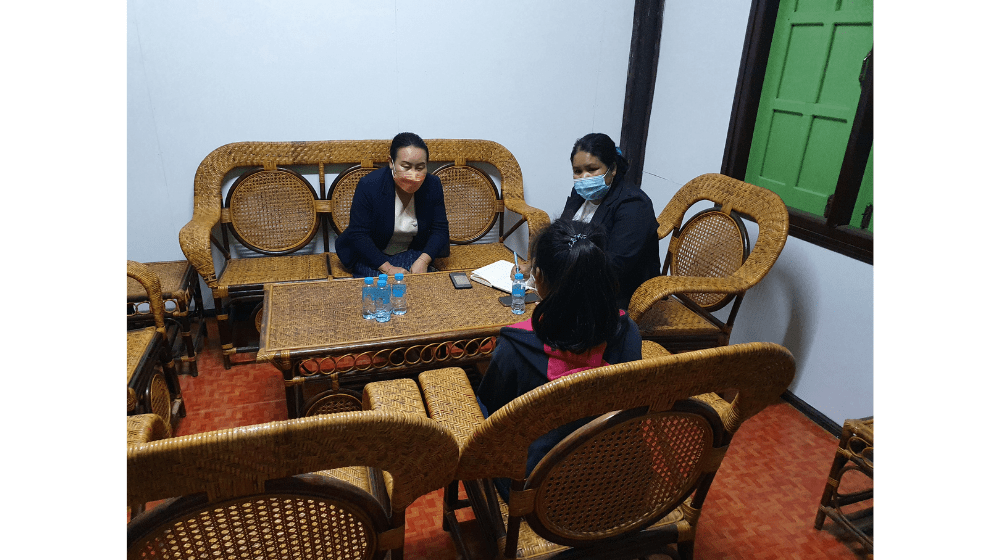Vientiane, 07 April 2022 - The United Nations Population Fund (UNFPA) supported 3 multisectoral consultations to develop Standard Operating Procedures (SOP) for gender-based violence (GBV) response for the Social sector, Health sector and overarching coordination and referral pathways, under the leadership of Lao Women’s Union (LWU), National Commission For the Advancement of Women and Mothers and Children (NCAWMC) and the Ministry of Health. The development of these sectoral and coordination SOPs are financially supported by UNFPA, KOICA and DFAT.
Historically, a fragmented approach has been in place in responding to violence against women, ad hoc measures and limited understanding by officials due to the absence of clear national guidelines. Establishing SOPs is critical to strengthen systems and create a clear framework for sectors to work vertically, as well as coordinate horizontally. Meaning, there is no “wrong door” for a survivor to walk through if they are seeking help - be it a hospital, a district LWU or the closest police station.
Mme Chansoda, Vice-President of LWU and NCAWMC spoke about the gap between the National Action Plan Preventing and Combating Violence Against Women and Children (2021-2025) and the reality of implementation of the plan to support women and children when they face violence: “Support is not systematic. We need coordinated standardized measures that are adapted to the Lao context and that ensure every woman and every girl who needs access to medical, social or legal services, is able to get it”.
During the three consultations held during Q1 2022, ministries/sectors discussed the challenges they experienced in implementing their roles and responsibilities under the Law on Preventing and Combatting Violence against Women and Children 2014, identified the gaps between international standards and current practice, discussed how to improve their first response services to survivors, and how to ensure ministries coordinate and promptly refer survivors to ensure they get the care they need.
The final SOPs will harmonize, coordinated institutional responses to GBV, and ensure that the staff who provide those services have a clear and comprehensive framework to work within to deliver women and girl survivors with quality care and assistance.
The development of the SOPs are essential to implement the Essential Services Package for Women and Girls Subject to Violence (ESP). The ESP encompasses all components of a coordinated multi-sectoral quality response for women and girls subject to violence. The ESP can significantly mitigate the consequences of violence on the well-being, health and safety of women and girls’ lives; assist in the recovery and empowerment of women, and stop violence from reoccurring. The ESP roll out, led by UNFPA in Lao PDR, is supported KOICA, DFAT, UK, Japan and SDC amongst others.
According to a 2014 prevalence study conducted in Lao PDR, approximately 30% of women who have been in relationships have been subjected to physical and/or sexual violence by a male partner in their lifetime. Even more concerningly, more than 70% of women who experienced violence in Laos did not seek help or support from anyone; and only around 2% of them sought services from authorities such as the health, social and justice sectors.
Ms Mariam Khan, UNFPA Representative to Lao PDR brought attention to these concerning statistics, but noted that the development of these SOPs for coordinated quality care will go a long way to improving them. She congratulated the leadership of the LWU, NCAWMC and all sectors for their engagement, emphasising that “UNFPA aims to strengthen systems and build capacity of government ministries and other GBV actors, by implementing sustainable frameworks and systems”.
***************
UNFPA, the UN's sexual and reproductive health agency, works in over 150 countries including Lao PDR, to achieve zero maternal deaths, zero unmet need for family planning and zero gender-based violence.
For more information please contact:
Ms. Sisouvanh Vorabouth, Programme Gender Analyst, UNFPA Laos
Email: vorabouth@unfpa.org
Ms. Vanly Lorkuangming
Communications and Partnerships Analyst, UNFPA Laos



